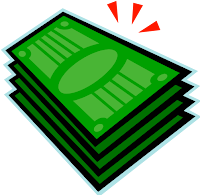Insight #1: Money Has No Intrinsic Value
 If I hand you a random piece of paper with green ink and a profile on it, is it money? In the US, that's all our money really is (in other countries, they get to use a wider range of ink colors, darn it!).
If I hand you a random piece of paper with green ink and a profile on it, is it money? In the US, that's all our money really is (in other countries, they get to use a wider range of ink colors, darn it!).It works as a medium of trade but only because we all agree to see it that way. Yes, there's that whole "backed by a heap of gold and silver in Ft. Knox" but have you ever actually seen that pile o' gold and silver? Me neither. I'm taking that on faith too. And I don't recommend you walk into a bank and ask to change your dollars for gold and silver.
If we all woke up tomorrow and decided that those pieces of paper didn't look all that valuable any more, our economy would collapse. Money is a mass delusion but a mass delusion we've all agreed to and gotten (more or less) comfortable with.
Insight #2: Money, Like Energy, Has To Move
 I may get a little prejudicial with this.
I may get a little prejudicial with this.Because money has no intrinsic value, because it is strictly a medium of exchange, I think it has be be, well, exchanged. It makes sense to lay a little aside for things you know you'll need it for in the future -- next month's rent, next year's vacation, your retirement -- but I think money actually....stagnates if you lay too much aside just because.
We've all met people whose whole sense of security comes from the number of zeroes in the bank / retirement / money market / etc. accounts. They can be reluctant to actually spend that money, however. It's existence in a place they can call their own is all that matters.
They often say they might need it for an emergency or "just in case". True enough. But I've met a few people who I think don't ever intend to spend it, not if they can help it. Money's whole value is that their name is attached to it and it's not going anywhere.
I also find these people tend towards a certain stagnation in themselves (yes, this is the prejudicial part). The more energy / attention / moments of your life you spend stacking up dollar bills just to have a stack of dollar bills, the less of that energy / attention / moments of your life are available for, well, living.
Insight #3: Money Picks Up The Energy Of Our Intentions
 Yeah, I'm gonna go all woo-woo on you here. You have been warned.
Yeah, I'm gonna go all woo-woo on you here. You have been warned.American paper money is made from organic matter -- a blend of cotton and linen (Australian paper money is made from polymers). I teach in Energy 101 that all matter has an energetic signature. So, dollar bills have an energetic signature, even before anyone has done anything with it.
But think about how many hands a dollar bill goes through. Each of those hands has a feeling about the money, has intention for it, assigns some emotional and energetic significance to it. That energy has to end up in the fibers of that dollar bill somehow.
I wonder if money is some of the most energetically charged things we touch on a daily basis? What difference would it make to that cotton and linen if the energy we touched it with was the energy of thanksgiving and pleasure vs. fear and insufficiency? Joy vs. anger? A spirit of plenty vs. a spirit of poverty?
Does money live differently in your pocket -- and affect you differently -- if you accept with an open attitude of thanksgiving? And give it out the same way?
I don't have an answer. I just find myself thinking about this a lot lately.
No comments:
Post a Comment